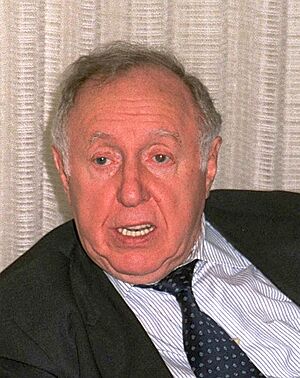Ignatz Bubis facts for kids
Quick facts for kids
Ignatz Bubis
|
|
|---|---|

Bubis in 1997
|
|
| Born | 12 January 1927 Breslau, Province of Lower Silesia
|
| Died | 13 August 1999 (aged 72) |
| Nationality | German |
Ignatz Bubis (born January 12, 1927 – died August 13, 1999) was a very important German Jewish leader. From 1992 to 1999, he was the chairman, and later president, of the Central Council of Jews in Germany. In this role, he worked hard to fight against antisemitism in Germany. Antisemitism is hatred or discrimination against Jewish people. Bubis was well-known in Frankfurt and across Germany, and he was involved in several public discussions.
Contents
Who Was Ignatz Bubis?
Ignatz Bubis was a significant figure who spoke up for the Jewish community in Germany. He dedicated his life to ensuring that the lessons of history were remembered. He also worked to create a better future for Jewish people in Germany.
Early Life and Challenges
Ignatz Bubis was born in 1927 in a city called Breslau, which is now Wrocław, Poland. In 1935, his family moved to Dęblin, Poland. During Nazi rule, Bubis and his family were forced to live in the Dęblin–Irena Ghetto. This was a small, crowded area where Jewish people were made to live. In 1944, he was sent to a labor camp in Częstochowa.
After the war ended and he was freed, he moved to Dresden. Later, he moved to West Germany because of the political situation in the Soviet-controlled part of Germany. He started a successful business in precious metals. In 1956, he moved to Frankfurt am Main and began working in real estate.
A Leader for German Jews
In Frankfurt, Ignatz Bubis became very active in Jewish community politics. In 1965, he joined the board of the Jewish community in Frankfurt. He served as its chairman from 1978 to 1981, and again from 1983 to 1999.
In 1977, he joined the board of the Central Council of Jews in Germany. He became the deputy chairman in 1989 and then the main chairman in 1992. He held this important position until he passed away.
Speaking Out: Public Discussions
As the leader of the Jewish community, Bubis often spoke out on important topics. He became a well-known voice in German public life. He often talked about Germany's past, especially the Nazi era.
The Memorial to Holocaust Victims
In 1994, Bubis was part of a group that chose the design for the Memorial to the Murdered Jews of Europe. This memorial honors the millions of Jewish people killed during the Holocaust. Bubis believed that a museum or learning center would be better than just a monument. He wanted people to learn from history.
In 1998, he expressed his frustration because the memorial was taking a long time to build. He felt it was important for all Germans to see it finished.
Standing Up to Criticism
Ignatz Bubis faced some public criticism during his life. For example, in the 1980s, a German writer named Rainer Werner Fassbinder wrote a play. Many people felt that a character in the play was a negative stereotype of a Jewish businessman, and they thought it was aimed at Bubis. Bubis and other Jewish community members protested the play. They even stopped its first performance to show their disapproval.
Later, in 1998, a German author named Martin Walser won an award. In his speech, Walser made comments about how the memory of Auschwitz and the Holocaust was being used. Bubis was very upset by these remarks. He left the event and publicly criticized Walser. After some time, Walser and Bubis met and settled their disagreement.
Later Years and Legacy
Ignatz Bubis was also involved in local politics in Frankfurt and the state of Hesse. He served on the board of the Free Democratic Party (FDP) in Hesse. In 1997, he helped the FDP win seats on the Frankfurt city council. He also served on the board of Hessian state radio for many years.
Shortly before he passed away, Bubis made a sad statement. He said that Jews could not live freely in Germany. This was after the grave of a previous Jewish leader, Heinz Galinski, was damaged in Berlin. Because of this, Bubis asked to be buried in Israel. He wanted to be buried in a place where he felt completely safe.
Ignatz Bubis is remembered as a strong and brave leader. He worked tirelessly to fight antisemitism and to ensure that the memory of the Holocaust was never forgotten. He helped shape discussions about Germany's past and future.
Images for kids
 | Janet Taylor Pickett |
 | Synthia Saint James |
 | Howardena Pindell |
 | Faith Ringgold |


